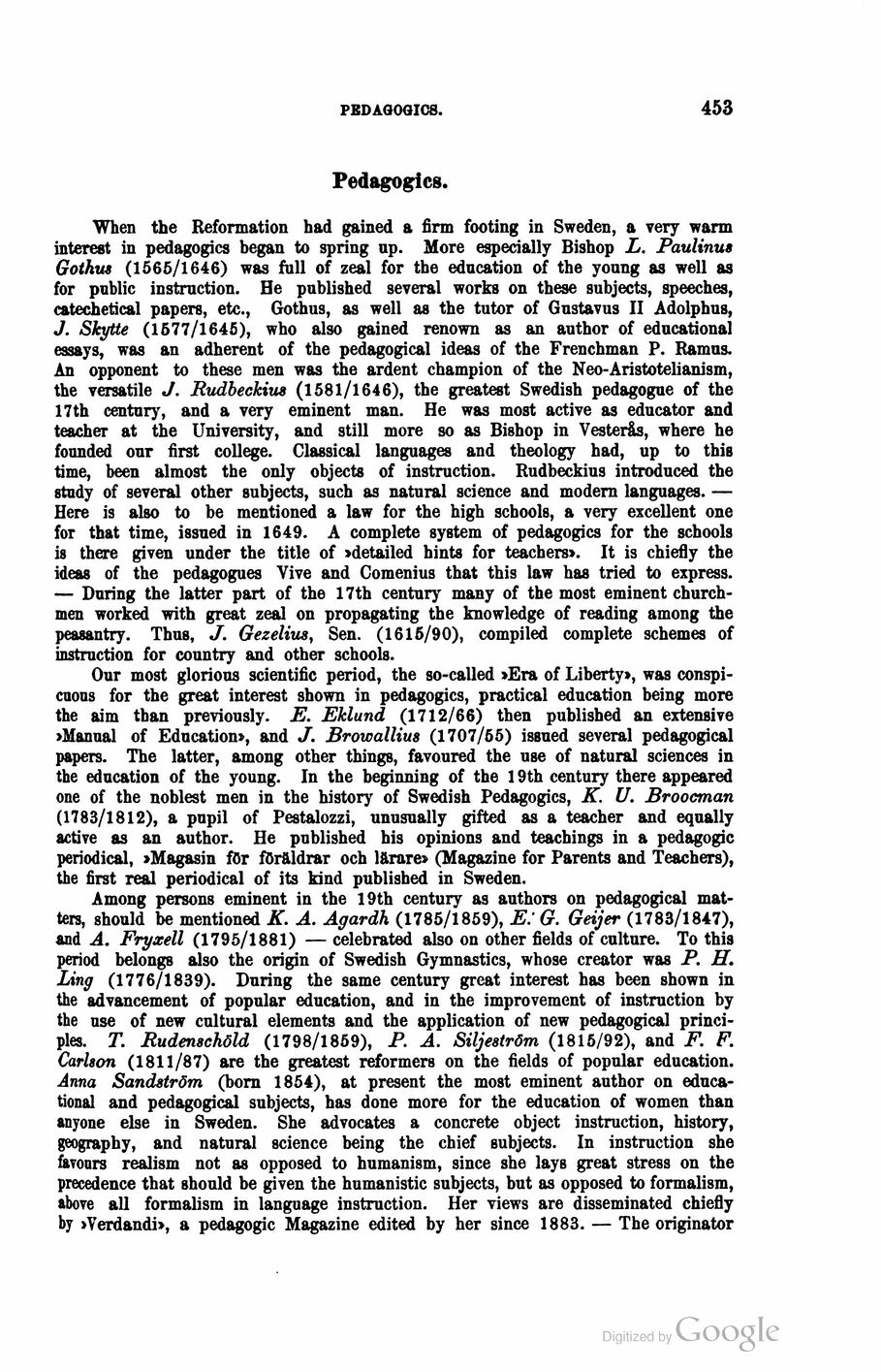
Full resolution (JPEG) - On this page / på denna sida - First part - IV. Education and Mental Culture - 10. Science - Pedagogics, by N. Lagerstedt, Ph. D., Stockholm

<< prev. page << föreg. sida << >> nästa sida >> next page >>
Below is the raw OCR text
from the above scanned image.
Do you see an error? Proofread the page now!
Här nedan syns maskintolkade texten från faksimilbilden ovan.
Ser du något fel? Korrekturläs sidan nu!
This page has never been proofread. / Denna sida har aldrig korrekturlästs.
PEDAGOGICS.
453
Pedagogics.
When the Reformation had gained a firm footing in Sweden, a very warm
interest in pedagogics began to spring up. More especially Bishop L. Paulinus
Gothus (1565/1646) was full of zeal for the education of the young as well as
for public instruction. He published several works on these subjects, speeches,
catechetical papers, etc., Gothus, as well as the tutor of Gustavus II Adolphus,
J. Skytte (1577/1645), who also gained renown as an author of educational
essays, was an adherent of the pedagogical ideas of the Frenchman P. Ramus.
An opponent to these men was the ardent champion of the Neo-Aristotelianism,
the versatile J. Rudbeckius (1581/1646), the greatest Swedish pedagogue of the
17th century, and a very eminent man. He was most active as educator and
teacher at the University, and still more so as Bishop in Vesterås, where he
founded our first college. Classical languages and theology had, up to this
time, been almost the only objects of instruction. Rudbeckius introduced the
study of several other subjects, such as natural science and modern languages. —
Here is also to be mentioned a law for the high schools, a very excellent one
for that time, issued in 1649. A complete system of pedagogics for the schools
is there given under the title of »detailed hints for teachers». It is chiefly the
ideas of the pedagogues Vive and Comenius that this law has tried to express.
— During the latter part of the 17th century many of the most eminent
churchmen worked with great zeal on propagating the knowledge of reading among the
peasantry. Thus, J. Gezelius, Sen. (1615/90), compiled complete schemes of
instruction for country and other schools.
Our most glorious scientific period, the so-called »Era of Liberty», was
conspicuous for the great interest shown in pedagogics, practical education being more
the aim than previously. E. Eklund (1712/66) then published an extensive
»Manual of Education», and J. Browallius (1707/55) issued several pedagogical
papers. The latter, among other things, favoured the use of natural sciences in
the education of the young. In the beginning of the 19th century there appeared
one of the noblest men in the history of Swedish Pedagogics, K. U. Broocman
(1783/1812), a pupil of Pestalozzi, unusually gifted as a teacher and equally
active as an author. He published his opinions and teachings in a pedagogic
periodical, »Magasin för föräldrar och lärare» (Magazine for Parents and Teachers),
the first real periodical of its kind published in Sweden.
Among persons eminent in the 19th century as authors on pedagogical
matters, should be mentioned K. A. Agardh (1785/1859), E: G. Geijer (1783/1847),
and A. Fryxell (1795/1881) — celebrated also on other fields of culture. To this
period belongs also the origin of Swedish Gymnastics, whose creator was P. H.
Ling (1776/1839). During the same century great interest has been shown in
the advancement of popular education, and in the improvement of instruction by
the use of new cultural elements and the application of new pedagogical
principles. T. Rudenschöld (1798/1859), P. A. Siljeström (1815/92), and F. F.
Carlson (1811/87) are the greatest reformers on the fields of popular education.
Anna Sandström (born 1854), at present the most eminent author on
educational and pedagogical subjects, has done more for the education of women than
anyone else in Sweden. She advocates a concrete object instruction, history,
geography, and natural science being the chief subjects. In instruction she
favours realism not as opposed to humanism, since she lays great stress on the
precedence that should be given the humanistic subjects, but as opposed to formalism,
above all formalism in language instruction. Her views are disseminated chiefly
by »Verdandi», a pedagogic Magazine edited by her since 1883. — The originator
<< prev. page << föreg. sida << >> nästa sida >> next page >>